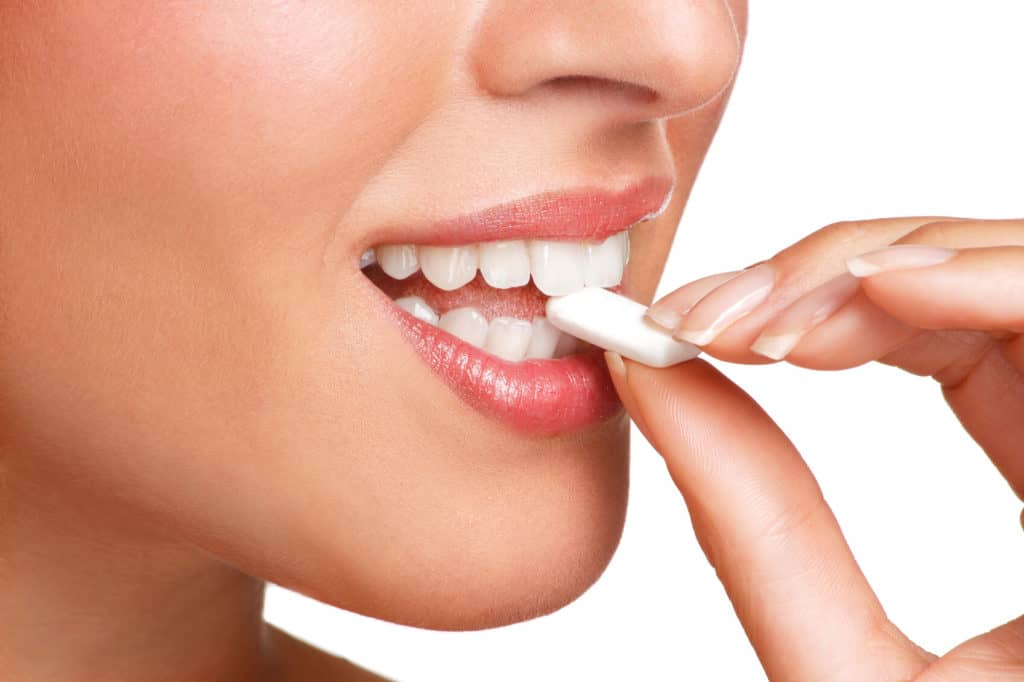At Implantation Dental Center, we love to talk to our patients about preventive oral health. It is our main goal and challenge as a dental office to educate our patients about how to treat their teeth and gums; as well as motivate them to maintain high quality care of their oral health.
Everybody knows the importance of brushing, flossing and rinsing daily. We all know what dentists say, and as a patient what we need to do, but most of the time the daily routine and life gets in the way and the oral care falls short.
As a preventive oral care benefit, chewing sugar free gum after a meal is allowed. It will actually help to maintain your oral health, in addition to your usual daily oral care regimen.
When we talk about chewing gum, the difference is in the type of gum. If it contains sugar it will actually help increase the risk of developing a cavity. If the gum contains Xylitol, it is better… much better.
Xylitol is a sugar substitute that bacteria cannot metabolize and prevents cavities. It has a delicious, sweet taste, and no unpleasant aftertaste. Xylitol has about a third the calories as table sugar, and is a healthy alternative for diabetics. Not only does it make an excellent sugar substitute, but it aids in the prevention of dental cavities, and reduces plaque formation.
Xylitol is found widely in nature, most of the fruits and vegetables that we eat on a daily basis have small amounts of Xylitol. It comes from two sources: corncobs or trees.
If for an instance you don’t carry a toothbrush, chewing a sugarfree gum is consider as a helpful alternative to reduce and remove plaque and debris in the mouth after a meal. It also reduces decay that causes bacteria.
Saliva is also very important. The primary roles and benefits of saliva include: waste removal, barrier and buffering agent, caries protection, fostering healthy plaque and wound healing. Chewing sugar free gum helps stimulate saliva flow; it is a big benefit for all patients, especially for people with xerostomia (dry mouth).
Benefits of chewing sugar free gum:
- Chewing sugar free gum will help you maintain a healthy oral pH, which means to neutralize plaque acids to protect against dental decay.
- Chewing sugar free gum will increase the volume of saliva promoting the development of more calcium and phosphate for remineralization.
- The action of chewing sugar free gum reduces the quantity of plaque.
- It will help you keep a faster oral clearance of debris as well as increase the pH to a more neutral territory.
As you can see, there are a lot of benefits of chewing sugar free gum, especially after a meal. If you find that chewing gum is painful, or are experiencing any type of jaw pain or a mandibular disorder symptom, contact Dr. Mauricio Hervas at Implantation Dental Center to 954.476.0770. He will assist you in locating other options for your situation.




I used sugarless gum as emergency substitute for my lower night guard. Used it for two weeks on cruise for 2 weeks in Europe when I forgot to bring it.
I use it bilaterally to open occlusion slightly.
See you in October for completion of #2 crown and post impression. Like your newsletter-Regards
I use sugarless gum as emergency substitute for my lower night guard. Used it for two weeks on cruise for 2 weeks in Europe when I forgot to bring it.
I chewed gum bilaterally to open occlusion slightly.
See you in October for completion of #2 crown and post impression. Like your newsletter-Regards